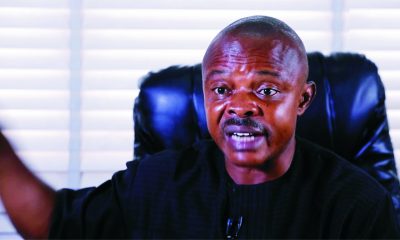Featured
PANDEF, NDD Reject 12 Provisions In PIB Insist On 10% OPEX For Trust Fund

The Pan-Niger Delta Forum (PANDEF) and the Niger Delta Dialogue (NDD) have rejected no fewer than 12 key provisions in the Petroleum Host and Impacted Communities Development Bill (PHICDB).
They warned that the key provisions in the bill must be redrafted, rephrased and restructured to accommodate the interests of the impoverished and neglected people of the oil and gas host and impacted communities in the Niger Delta, or the peace and appropriate development sought by the bill would elude both the region and the country as a whole.
The critical Niger Delta groups expressed their rejection of the vital provisions of the bill during the NDD’s Strategic Communication and Advocacy Training session for major stakeholders in PANDEF, NDD and the various Policy Advocacy Committees (PACs) in Port Harcourt, recently.
The Tide reports that the PHICDB, an integral part of the Petroleum Industry Bill (PIB) currently receiving legislative consideration at the two chambers of the National Assembly, “seeks to foster sustainable shared prosperity amongst host and impacted communities; provide direct social and economic benefits from petroleum operations to host and impacted communities; enhance peaceful and harmonious coexistence between settlers and host and impacted communities; as well as, create a framework to support host and impacted communities’ development” process.
The PIB, which has been sleeping in the drawers of the federal lawmakers for more than 18 years, is the oldest pieces of legislation yet to receive the majority consent of National Assembly members in Nigeria’s democratic history.
Among the provisions is the Interpretations Section, which they claim, was vague in the use of words and terms “host and impacted communities” to describe oil-bearing communities in the region, insisted that the lawmakers must clearly identify communities by the specific roles they play in the hydrocarbons production chain.
They “recommended that host communities should be clearly defined as villages where oil wells and flow stations are situated. Impacted communities should be defined as villages where oil installations such as pipelines run through as well as villages located within a three kilometer radius of those where oil wells and gas plants or flaring points are domiciled”, in the final bill to be passed.
The stakeholders condemned the observed silence of the bill on how the clusters should be formed and the trust fund shared, and recommended that clusters should be carved out on the basis of state Houses of Assembly constituencies for ease of coordination and mobilisation.
They also condemned the vague use of the term ‘Settlor(s)’ in Part 2, Section 2, Subsection 1 and 2 of the draft bill, and insisted that each International Oil Company (IOC) must be deemed as a Settlor(s) and have its own trust fund incorporated in the clusters to avoid confusion in funding and projects’ implementation.
The stakeholders wondered why “sabotage spill” was not clearly defined but its consequences were highlighted in the draft bill, and “recommended that there should be no clause compelling the Settlor(s) not to pay what is agreed until they stop operation by virtue of licence expiration or cessation of operational existence in the host and impacted communities”.
They further condemned the observed silence in the sharing formula of the accruing fund from the “Settlor(s)” between host and impacted communities, particularly given that there are more impacted than host communities in available oil industry records, and “recommended that a sharing formula of 70 per cent for host communities and 30 per cent for impacted communities” should be spelt out in the bill, when passed for the President’s assent.
The stakeholders also expressed worry that Part 3, Section 9, Subsection 1 and 2 of the draft bill rests the creation and determination of the membership of the Board of Trustees (BoTs) for the trust funds on the IOCs, warning that this may undermine the peace effort in the region, and further undercut the interests of oil-bearing communities.
They, therefore, “recommended that the BOTs should be a five-member body with a representative each from Host Communities, Impacted Communities, Federal Government, and two representatives for the Settlor(s). Each stakeholder should determine who their representatives will be. Representatives of Host, Impacted communities and the Settlor(s) must be indigenes of the cluster area.”
The PACs berated the Presidency for not giving details on the actual composition of the day-to-day management committees of the cluster trusts as enunciated in Section 14 of the proposed bill, and “recommended a nine-man committee with two representatives each nominated by Host and Impacted communities; three representatives of Settlor(s); and one representative each from state and federal governments, respectively”.
They condemned the provision of only 2.5 per cent of the actual operating expenditure (AOPEX), against 10 per cent in the previous bill submitted to the 8th NASS, for the smooth running of the recurrent and capital expenditures of the cluster trusts, and “recommended a minimum of 10 per cent of the operating expenditure (OPEX) to fund the cluster trusts and 5 per cent equity participation in the operations of the IOCs for both Host and Impacted communities”, in the final copy of the bill.
The stakeholders also picked holes in Section 11, which splits the utilization of the Endowment Fund to 70 per cent for capital expenditure; 20 per cent for the Reserve Fund; and 10 per cent for the Settlor(s) special projects, and “recommended that 75 per cent be reserved for capital expenditure; 20 per cent for the Reserve Fund; and 5 per cent for logistical and recurrent expenditures off the BoTs, management committees and the advisory committees”.
They expressed worry that the Presidency failed to specify how the operating expenditures of the Settlor(s) would be verified to ascertain the accruing funds to the cluster trusts, and “recommended that the OPEX, which is usually audited from the previous year’s spend, should be used to factor the accruing fund for the current year, e.g. AOPEX for Year A, audited in Year B, and used to calculate budget for Year C”.
The stakeholders blasted the Presidency for including in Section 22 that the Settlors’ OPEX paid into the trust fund shall be subject to Petroleum Income Tax (PIT) and Companies Income Tax (CIT) deductibles, and recommended that the Endowment Trust Fund should be excluded from any form of taxation, as the bill, in its original state would limit the amount of money available for development projects and programmes in the region.
The PACs queried Section 5 of the present bill, which does not give specific punishments for under-payment, late payment or non-payment of agreed money into the cluster trust fund as at when due, and recommended that failure by the Settlor(s) to pay the required percentage of the OPEX by first day of the year, should attract immediate suspension of operating licence; failure to do so by first day of second month should attract immediate withdrawal of operating licence; while before a Settlor gets another approval to operate in the same Oil Mining Lease (OML) or Oil Prospecting Licence (OPL), two per cent of the entire money owed the cluster trust fund must be paid as penalty in addition to the full payment of the entire balance in outstanding debt to the cluster communities.
The stakeholders lamented the lack of sufficient clarity on timeframes for incorporation of cluster trusts for Host and Impacted communities and the failure to stipulate penalties for reneging on implementation of agreed projects and programmes by the Settlor(s) as contained in Section 3 of the bill before the NASS, and recommended that deadlines be specified for the incorporation of cluster trust funds and inauguration of management committees and BoTs, just as the bill must specify duration not exceeding 24 months before the completion and commissioning of physical infrastructure projects in the affected communities, and six months for execution of human capacity development programmes such as economic empowerment schemes, scholarship initiatives, skills acquisition and entrepreneurship opportunities, among others.
All the parties warned that failure to accommodate the recommendations of the PACs in the bill, which the NASS has promised to pass into law by February, 2021, would be devastating for the people, and may trigger another round of tension and agitations in the region.
By: Susan Serekara-Nwikhana
Featured
RSG Commits To Workers’ Welfare …. Calls For Sustained Govt, Labour Partnership

The Administrator of Rivers State, Retired Vice Admiral Ibok-Ete Ekwe Ibas, has assured the commitment of Rivers State government to workers’s welfare and industrial harmony in Rivers State.
The Sole Administrator gave the assurance after meeting with leadership of organized labour unions at the Government House, Port Harcourt on Wednesday.
Ibas reaffirmed government’s policy of prompt payment of salaries and pensions to workers and retirees, stating that all local government employees are not receiving the approved minimum wage.
He disclosed that approval has been given for payment of newly employed staff at Rivers State University Teaching Hospital and the Judiciary, while medical workers in Local Government Areas will now receive correct wages.
Ibas explained that, Government is reviewing implementation challenges of the Contributory Pension Scheme ahead of the July 2025 deadline, adding that Intervention buses have been reintroduced to ease workers’ transportation ,with plans to expand the fleet.
He said specialized leadership training for top civil servants will commence within two weeks, while due consideration is being given to implementing the N32,000 consequential adjustment for pensioners and clearing outstanding gratuities.
Ibas commended Rivers State workers for their dedication to service and called for sustained partnership with labour unions to maintain industrial peace.
“This administration recognizes workers as critical partners in development. We remain committed to addressing your legitimate concerns within available resources,” he stated.
The State NLC Chairman, Comrade Alex Agwanwor, thanked the Administrator for the steps taken so far with regard to workers welfare while appreciating his disposition towards alleviating the transportation problem faced by workers.
He also expressed appreciation for the government’s openness to dialogue and pledged continued cooperation towards achieving mutual goals.
The Rivers State Government assured all workers of its unwavering commitment to their welfare and called for continued dedication to service delivery for the collective progress of our dear State.
Featured
Labour Unions In Rivers Call For Improved Standard Living For Workers

The Nigeria Labour Congress (NLC), Rivers Council, has called for policies that will improve the economic situation of the country in order to ensure enhanced living standard for workers.
The State Chairman, Mr Alex Agwanwor, made the remark on behalf of the unions affiliated to Labour Congress during the 2025 workers day celebration in Port Harcourt, yesterday.
Agwanwor highlighted the demands of the Unions which included the immediate payment of pension arrears, implementation of the N32,000 minimum wage for pensioners, and payment of gratuities and death benefits without further delay.
“We are calling for the regulation and protection of e-hailing drivers, implementation of increments and promotions, and resolution of long-standing issues in the polytechnic sector,” he said.
Agwanwor on behalf of the unions appealed to President Bola Tinubu to reinstate the democratically elected Governor, Deputy Governor, and members of the Rivers State House of Assembly.
He stressed the importance of democratic governance and good working relationship with elected representatives.
According to him, the unions expressed disappointment over the imposition of taxes, increase in electricity tariff, and high cost of goods and services, which have further worsened the plight of workers.
“We urge the federal government to take measures to alleviate the suffering of citizens,” he said.
Featured
Tinubu committed to unlocking Nigeria’s potential – Shettima

Vice-President Kashim Shettima says President Bola Tinubu is committed to unlocking Nigeria’s full potential and position the country as a leading force on the African continent.
Shettima stated this when he hosted a delegation from the Hertie School of Governance, Berlin, led by its Senior Fellow, Dr Rolf Alter, at the Presidential Villa in Abuja last Wednesday.
He said Nigeria was actively seeking expertise from the global best institutions to enhance policy formulation and implementation, particularly in human capital development.
The Vice-President noted that President Tinubu was determined to elevate Nigeria to its rightful position as a leading force in Africa.
“The current crop of leadership in Nigeria under President Bola Ahmed Tinubu is ready and willing to unleash the full potential of the Nigerian nation on the African continent.
” We are laying the groundwork through strategic reforms, and at the heart of it, is human capital development.”
He described the Hertie School as a valuable partner in the journey.
According to him, Hertie School of Governance, Berlin, has track record and institutional knowledge to add value to our policy formulation and delivery, especially in this disruptive age.
Shettima reiterated the government’s priority on upskilling Nigerians, saying ” skills are very important, and with our Human Capital Development (HCD) 2.0 programme.
“We are in a position to unleash the full potential of the Nigerian people by enhancing their capital skills.”
The Vice-President acknowledged the vital support of international development partners in that effort.
” I want to thank the World Bank, the European Union, the Bill and Melinda Gates Foundation, and all our partners in that drive to add value to the Nigerian nation,” he maintained.
The Vice-President said human capital development was both an economic imperative and a social necessity.
Shettima assured the delegation of the government’s readiness to deepen cooperation.
” We need the skills and the capacity from your school. The world is now knowledge-driven.
“I wish to implore you to have a very warm and robust partnership with the government and people of Nigeria.”
Shettima further explained recent economic decisions of the government, including fuel subsidy removal and foreign exchange reforms.
“The removal of fuel subsidy, the unification of the exchange rate regime and the revolution in the energy sector are all painful processes, but at the end of the day, the Nigerian people will laugh last.
“President Tinubu is a very modern leader who is willing to take far-reaching, courageous decisions to reposition the Nigerian economy,” he added.
Earlier, Alter, congratulated the Tinubu administration for the successful launch and implementation of the Human Capital Development (HCD) strategy.
The group leader described the development as ambitious and targeted towards the improvement of the lives of the citizens.
He expressed satisfaction with the outcome of his engagements since arriving in the country.
He applauded the zeal, commitment, energy and goodwill observed among stakeholders in the implementation of Nigeria’s HCD programme.
Alter said the Hertie School of Governance would work closely with authorities in Nigeria across different levels to deliver programmes specifically designed to address the unique needs of the country.
He, however, stressed the need for government officials at different levels to be agile and amenable to the dynamics of the evolving world, particularly as Nigeria attempted to successfully accelerate its human capital development aspirations.
-
Business4 days ago
Smuggled Rice Tops Seized Items List In 2025
-

 News3 days ago
News3 days agoNBA President Sues For Workers’ Protection, Better Wage
-

 Opinion4 days ago
Opinion4 days agoEnding Malaria Menace For Improved Health
-
Sports4 days ago
Arsenal Eye Special Performance In Paris
-

 News4 days ago
News4 days agoFG Licenses 11 New Private Universities
-
Business4 days ago
Over 2m Passengers Board Blue Rail Train – Commissioner
-

 News3 days ago
News3 days agoAdeleke Approves N4bn Bond To Clear Pension Arrears
-

 Opinion4 days ago
Opinion4 days agoNigeria’s Poor Economy And High Unemployment Rates












